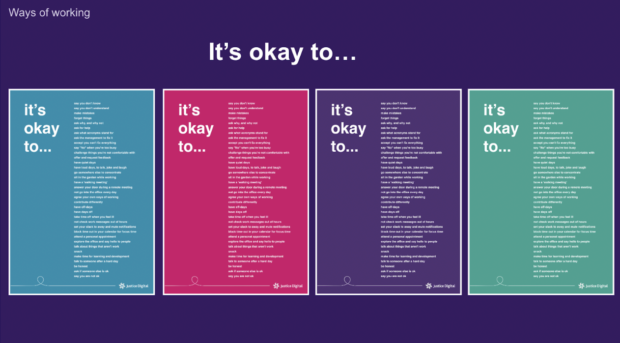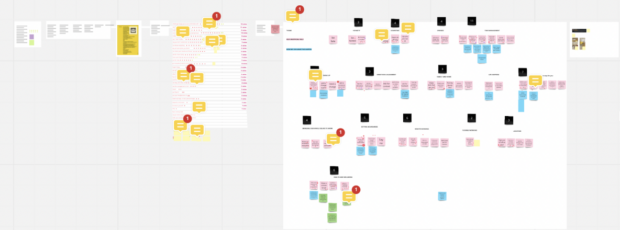The original 'It's okay to' poster was created by GDS to communicate the 'unofficial' ways of working and to help create a safe psychological environment for new team members.
At Justice Digital (the digital arm of the Ministry of Justice), our teams had grown over the lockdown period, and hybrid working became our new normal. Our teams were often no longer co-located, and this brought new ways of working and unwritten rules.
We revised the GDS 'It's okay to' poster to reflect our new ways of working at Justice Digital, and we wanted to share this with you.

Creating psychological safety in our ways of working:
GDS played an essential role in setting direction and opening possibilities for doing government services well. Part of this was understanding the importance of - and taking steps to support - a positive workplace culture. The early pioneers recognised the importance of this by considering workplace culture and making it explicit. Since its publication, Giles Turnball's classic blog and the poster that resulted from his team's attempt 'to communicate the unofficial stuff' has been a touchstone for many of us working on public services. This was an obvious starting point when we wanted to look at our culture and refresh it for post-covid hybrid working and rapid growth.

We held workshops and discussions about our culture and which aspects we wanted to protect and extend. The importance of psychological safety and the connection between well-being and performance were recurrent themes. Collaboration is at the heart of everything we do, and psychological safety is at the heart of effective collaboration. The extent to which we can effectively collaborate in multidisciplinary teams sets the bar for what we can achieve.
We want to build a culture where people feel safe, a culture of trust and openness. We want to create a relaxed and comfortable space, to act as the foundation for unrestrained creativity.
Our teams work in often fast-paced environments, building services for people within complex spaces in their lives. Also, we work on serious issues at MoJ, things that matter. That's why it's essential to support psychological safety. When deadlines are near, living up to your shared values is more challenging than you might hope. A big poster on the wall can help.
"I found the community poster a timely and helpful reminder that 'it is OK to.'"
“I was having some childcare issues, which I'm aware that I can take time off for, but I did not need to. Therefore, reading the contract earlier in the week reassured me and prompted me to define my way of working for the couple of days when I had the issue. This enabled me to work flexibly, knowing that the team were aware and supportive of my circumstances at that point in time."
Our statements:
While these statements reflect our ways of working, we wanted to include editable poster versions to be tailored by our wider teams and departments across Justice Digital. It’s why we created editable versions of the poster and included these files further down the blog (in Figma). We encourage teams to download these and tailor them to their organisations or teams and their ways of working!
(We’ve starred the new ones we curated from our cross-discipline teams.)
It’s ok to…
- say you don't know
- say you don't understand
- make mistakes
- forget things
- ask why and why not
- ask for help
- ask what acronyms stand for
- ask the management to fix it
- accept you can't fix everything*
- say "No" when you're too busy
- challenge things you're not comfortable with
- offer and request feedback*
- have quiet days
- have loud days, to talk, joke and laugh
- go somewhere else to concentrate
- sit in the garden while working*
- have a 'walking meeting'*
- answer your door during a remote meeting*
- not go into the office every day*
- agree your own ways of working*
- contribute differently*
- have off-days
- have days off
- take time off when you feel ill*
- not check work messages out of hours*
- set your slack to away and mute notifications*
- block time out in your calendar for focus time*
- attend a personal appointment*
- explore the office and say hello to people*
- talk about things that aren't work*
- snack
- make time for learning and development*
- talk to someone after a hard day*
- be honest*
- ask if someone else is okay*
- say you are not okay*
You can download the posters here:
We have shared the original Figma file so you can further tailor the ‘It’s okay to’ poster for your organisation or team. Here’s the editable Figma file.
If you’d like to print the PDF version of our posters, you can download the PDF files here.
P.S. We always welcome people to find out more about our open roles. Take a look at our open positions here.

2 comments
Comment by Vicky posted on
What's not clear from this is what has been changed from the original GDS one - it would be good to know what was changed and why? From a quick eyeball they look 90% the same but this might just be me.
Comment by James posted on
Thanks for your comment Vicky. The asterisks in the list show the additions we made. We added more than we took out which is perhaps something that could be improved as the list has grown in length.
As for the 'why' behind the changes, some are about hybrid working e.g. 'have a walking meeting' or 'sit in the garden while working.'
Others it is a bit hard to summarise as they were the product of at times quite long conversations or stories we shared as part of the process. I think list is most meaningful to those who took part in it's development and would encourage anyone else looking to support psychological safety where they work to develop their own list, put priority on the conversations but use something like a list of 'its ok to..' to ground the discussions and then act as a reminder of them afterwards.